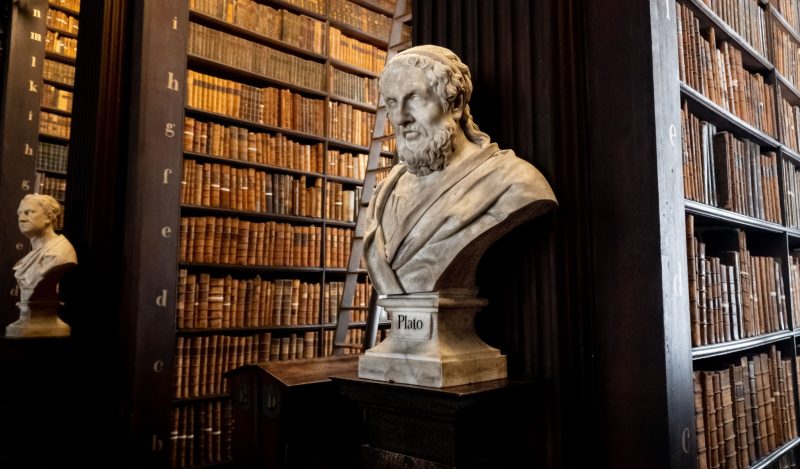Everything we do as humans is provisional. Because of time’s eroding power, everything is revisable. There is a reason for the word ‘decision’ being a part of our language. Not accidentally, the term derives from the Latin for ‘cut;’ in other words, when we decide something, we make a volitional ‘cut’ of sorts in the sequence of events, or in the reasoning concerning such events, that precede the decision – a concrete reminder that human beings are not equipped with an algorithmic device that enables them to know with absolute certainty what course of action to pursue. Every decision, therefore, represents an acknowledgment that we have to act with incomplete, provisional knowledge, and by implication, that more information and more comprehension could lead to a different decision.
Philosophers have known this for centuries, even if their philosophies sometimes give the opposite impression. Nietzsche – who was himself a thinker of provisionality, as evinced in his exhortation, to overcome the ‘spirit of revenge’ against time’s irreversible passage – did Socrates an injustice when he used his name as shorthand for the excessive rationalism of Western culture. Rather than ‘Socratism,’ he should have used the term ‘Platonism,’ provided he meant the reception of Plato’s work, and not the Greek master’s work ‘itself’ – even if, unavoidably, the latter is ‘itself’ only available to us after centuries of translations.
After all, anyone who has read Plato’s texts carefully – even in translation – and not only through the eyes of his countless commentators, soon recognises the distance that separates what may be called the two ‘faces’ of Plato. There is the metaphysical, idealist Plato, and there is the ‘poetically reflective’ Plato whose writings (perhaps unexpectedly) reveal what one might call his nuanced awareness of the ineradicable provisionality of even the ostensibly strictest distinctions. It is difficult to say which one of these has given rise to a never-ending series of ‘footnotes’ among Western philosophers since his time, according to Alfred N. Whitehead, who noted of Plato’s writings that the ‘wealth of general ideas scattered through them’ comprise a ‘an inexhaustible mine of suggestion,’ but I would opt for the second one.
In the Phaedrus Plato shows that he knew, for instance, that a “pharmakon” is both poison and remedy, that language is simultaneously a rhetorical instrument of persuasion and the arena where struggles for truth are enacted; both the soil where poetic powers germinate and metaphysical armour for the protection of mortal bodies. Poets and dithyrambic music do not belong in the ideal republic, according to him, but paradoxically the poet in Plato is harnessed for the sensorily evocative linguistic embodiment of the epistemic inferiority of the senses, as the myth of the cave in the Republic demonstrates, accompanied by his simultaneous claim that the truth represented by the sun shining outside the cave transcends the perspectival limitations of the senses.
Do these paradoxes not reflect Plato’s awareness of the provisionality of his metaphysical bulwark against human uncertainty and finitude, embodied in the supratemporal, archetypal Forms, in which all existing things participate, however imperfectly?
The clearest indication that Plato knew about the ineradicably provisional status of human life lies in his depiction of his teacher, Socrates, who did not write anything himself, as the archetypal philosopher of provisionality – unambiguously captured in Socrates’s famous ‘docta ignorantia’ (learned ignorance), that the only thing humans know with certainty is ‘how little they know.’ Despite these signs in Plato’s work, that he was quite conscious of the limitations to human knowledge (further demonstrated in his notion of the paradoxical, errant causality of the Khôra in his Timaeus, which simultaneously is and is not in space), what the philosophical tradition has sought to emphasise is Plato’s own strenuous attempt, in his metaphysical doctrine of the archetypal Forms, to provide supra-sensible protection against the inescapable erosion of human knowledge by time – for this is what is ultimately indexed in an awareness of provisionality.
These considerations – which could be extended significantly – make a mockery of the idea that there is a fail-safe research methodology (with its accompanying methods), that would guarantee the time-resistant validity of human knowledge, instead of acknowledging that, despite our very best efforts at securing precise, unassailable knowledge, it is nonetheless always already infected with the eroding germ of time. This is the sobering insight gained from one of Jacques Derrida’s most exemplary poststructuralist essays in Writing and Difference, namely ‘Structure, sign and play in the discourse of the human sciences,’ where (following Claude Lévi-Strauss) he distinguishes between the image of the ‘bricoleur’ (tinkerer, handyman, Jack-of-all-trades) and the ‘engineer.’
The former avails him – or herself of any tool or material at hand to construct or ‘fix’ things in order to restore them to working condition, while the engineer insists on fail-safe instruments and working materials to guarantee exactitude of measurement and time-resistant functioning of the products of their design and work. Needless to stress, these two types function as metaphors for distinct ways of approaching the world around us – some people think like the ‘engineer;’ others like the ‘bricoleur.’
Contrary to the standard reading of this essay by Derrida (where this is but one of the stages of his complex argument), which erroneously attributes to him a kind of postmodernist privileging of the bricoleur over the engineer, he states explicitly that humans are in no position to choose between these two paradigmatic figures of knowledge – inescapably we have to choose both. What does this mean? Simply that while we have the epistemic duty to emulate the engineer, we also have to face the sobering thought that, our best efforts at constructing unassailable knowledge notwithstanding, our knowledge systems – even in its most ‘tried and tested’ form, namely the sciences – cannot evade the ruinous effects of time, or history.
This is amply demonstrated with regard to the history of physics in Thomas Kuhn’s The Structure of Scientific Revolutions (1962), although Kuhn’s thesis, articulated in the book, has many rationalistic detractors, who cannot bear the thought of science being equally subject to temporal constraints as any other form of human knowledge.
Such champions of epistemic absolutism need only remind themselves of the exemplarily Socratic admission of the leader of one of the two teams at CERN’s Giant Hadron Collider that worked on the attempt to confirm the ‘existence’ of the ‘Higgs boson’ (or so-called ‘God-particle’) – an Italian woman physicist named Fabiola Gianotti – that the confirmation of its ‘probable’ existence, far from representing the summation of ‘complete’ knowledge in the realm of physics, merely means that the work of understanding the physical universe is only beginning. Socrates all over again, and from a natural scientist.
How is this possible? What she was referring to is the fact that physicists now face the daunting prospect of probing the nature of dark energy and dark matter which, they claim, together comprise the largest part of the physical universe, and of which physics knows hardly anything except its percentile extent. And who knows how many revisions will be made regarding the ‘standard model’ of physics in the course of unravelling the structure, nature, and functioning of these two ‘dark’ entities – if they can be called ‘entities’ at all? Another confirmation of the provisionality of human knowledge.
This, incidentally, is also related to Jacques Lacan’s notorious (but understandable) claim that the structure of human knowledge is ‘paranoiac,’ by which he evidently meant that we are deluded into believing that human knowledge systems are far more enduringly unassailable than they actually are – a Lacanian claim that resonates with the insights of the redoubtable English novelist, John Fowles, in his novel, The Magus.
Returning to Plato’s oft-ignored wisdom concerning provisionality, it is not difficult to establish a connection between him and Lacan, who was a very thorough reader of Plato, for instance of the latter’s Symposium – perhaps the most important of his dialogues on love. Just as Plato shows with admirable insight that, what makes one into a lover – and indirectly also a philosopher – is the fact that the beloved, insofar as she or he remains a beloved, instead of a possessed, always has to be ‘just out of reach’ of the lover. We are lovers, or philosophers, to the extent that we ‘desire’ our beloved, or in the case of the philosopher (and the same goes for the scientist), knowledge, neither of which we could ever totally ‘possess.’
What this suggests, of course, is that the lover or philosopher never quite reaches fulfillment of their desire – should you ‘attain’ the desired beloved, or knowledge, your desire would evaporate, because there would be no need for it any longer. Desire is a function of absence or lack. This makes a lot of sense – provisionally, at least.
If human beings were to be able, at last – which, by and large, they are not – to accept and embrace their own finitude and temporality, they would realise that all things human in the domain of culture and the arts, science, and even philosophy, are provisional, in the strict sense of being subject to revision, ‘correction,’ modification, or amplification. Many of the difficulties faced by people in the world today derive from their futile, hubristic attempt, to be ‘engineers’ in the sense of perfecting knowledge through science and technology, ignoring Derrida’s counsel, that we are also, finally, mere bricoleurs, or tinkerers, jacks of all trades.
Hardly ever before in human history has the futility of believing that one can overcome the ineluctable limitations on human endeavours been more amply demonstrated than during the past five years. What the international cabal of neo-fascists at the World Economic Forum (a misnomer if ever there was one) had regarded as a foregone conclusion, namely, to ‘condition’ people into accepting the proto-totalitarian regime they tried to impose through Covid lockdowns, social distancing, masking, and eventually by mandating, as far as possible, the deadly Covid pseudo-vaccines, has turned out, in retrospect, to have been merely provisional.
This is no reason for complacency on our part, however, as most of the awake tribe know. Their implicit belief in their quasi-divine powers guarantees that they will try again.
[This post is loosely based on my essay, published in 1998 in the Afrikaans Journal for Philosophy and Cultural Criticism, Fragmente, and titled ‘Filosofie van Voorlopigheid.’]
Join the conversation:


Published under a Creative Commons Attribution 4.0 International License
For reprints, please set the canonical link back to the original Brownstone Institute Article and Author.









